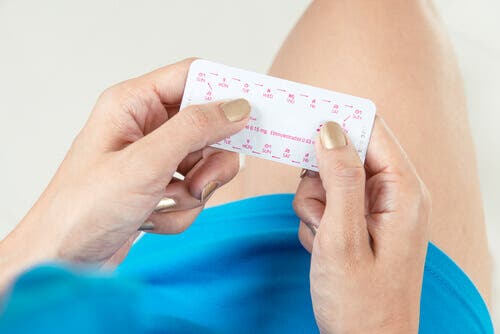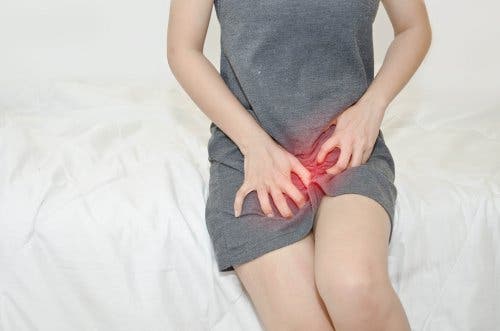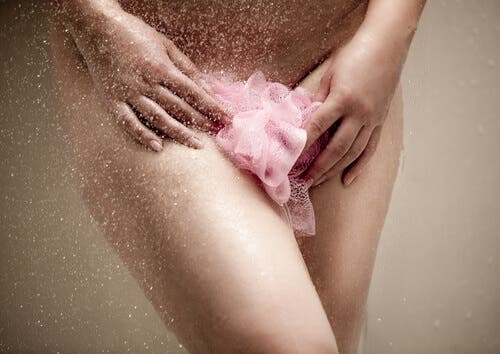Lack of Vaginal Lubrication: What Causes It?

Although normally a lack of vaginal lubrication or vaginal dryness is associated with menopause, the truth is that it can appear at any time in a woman’s life. The causes are many and varied.
Although it’s common to associate it with certain conditions or hormonal imbalances, the truth is that it can also be caused, surprisingly, by emotional disorders, such as stress or anxiety.
Let’s dig deeper.
Lack of vaginal lubrication
The wall of the vagina produces a natural lubricant (mucosa) that helps keep it hydrated. Likewise, the vaginal microbiota or flora, a series of microorganisms that protect and keep it healthy, also inhabits this part of the genitals.
However, when the hydration or flora are altered, it causes what is vaginal dryness, that is, the flow decreases, causing a lack of lubrication of the vaginal tissues.

Normally, this dryness isn’t a bad thing. However, it may be a symptom of some type of condition, so you should go to the gynecologist and explain the situation.
On the other hand, vaginal dryness or lack of lubrication can cause pain during sexual intercourse, so it can affect a woman’s quality of life and her intimate and personal relationships.
Likewise, it can also produce a feeling of tightness, itching, or irritation, so it’s better to try to solve the problem to avoid having to endure all these discomforts.
Most common causes
Hormonal changes

According to the National Library of Medicine of the United States, estrogens are hormones that keep the vagina hydrated and healthy. For this reason, if your levels drop, you’re likely to get vaginal dryness.
Precisely for this reason, a lack of lubrication is usually associated with menopause, since this is a phase in which your body’s production of estrogens drops sharply. However, in addition to menopause, there are other factors that could cause a reduction in the production of estrogens:
- Ovarian cycle and menstruation
- Some drugs or hormones used to treat breast cancer or infertility, for example
- Certain antidepressants and antihistamines
- Surgery to remove the ovaries
- Chemotherapy
- Other phases such as lactation, or just after delivery
Stress and depression
Stress and depression are enemies of health and well-being in many different ways. Additionally, both can cause a lack of vaginal lubrication.
Indeed, these problems can cause a decrease in sexual desire in women and, consequently, a lack of vaginal lubrication. For this reason, it can become an obstacle to pleasurable sexual relationships.
Vaginal infections

An infection can also cause a lack of vaginal lubrication. Thus, microorganisms such as Candida albicans or Gardnerella vaginalis, among others, can cause sensitivity, irritation, inflammation, and reduction of vaginal lubrication.
In this case, it’s important to consult your gynecologist right away in order to start treatment.
We recommend you read: Vaginal Yeast Infections: Causes and Solutions
Diabetes
Especially in the case of diabetic women, whose glucose isn’t properly controlled, it may cause a lack of lubrication, as reported in this study carried out by a team from the National Institute of Endocrinology (Cuba).
This is because damage to blood vessels can limit blood flow to the walls of the vagina, decreasing lubrication and sexual arousal.
Sjogren’s syndrome
Sjögren’s syndrome is a chronic autoimmune disease caused by the infiltration of leukocytes into the exocrine glands. For this reason, people who suffer from this syndrome usually experience a lack of saliva and itching or feeling of grit in the eyes.
Likewise, the Arthritis Foundation states that this condition can also cause vaginal dryness. For this reason, if you notice other symptoms such as dry mouth and eyes together with the lack of lubrication, you should see your doctor.
Excessive use of vaginal soaps and lotions

Although it may seem strange, excessive hygiene in the vaginal area can cause dryness. In effect, it can affect the balance of flora, causing it to be disturbed and not properly lubricated.
Once you return to regular hygiene practices, the lubrication usually returns to normal levels, improving your symptoms.
You might be interested in: 6 Habits That Cause Vaginal Yeast Infections
Consult your gynecologist
Now you know some of the factors that might cause a lack of vaginal lubrication. In any case, you should consult your gynecologist so that they can find the exact problem and start treatment.
On the other hand, there are many female lubricating gels on the market. These products, without a doubt, can help you to relieve discomfort and feel much better during sexual intercourse.
All cited sources were thoroughly reviewed by our team to ensure their quality, reliability, currency, and validity. The bibliography of this article was considered reliable and of academic or scientific accuracy.
This text is provided for informational purposes only and does not replace consultation with a professional. If in doubt, consult your specialist.








